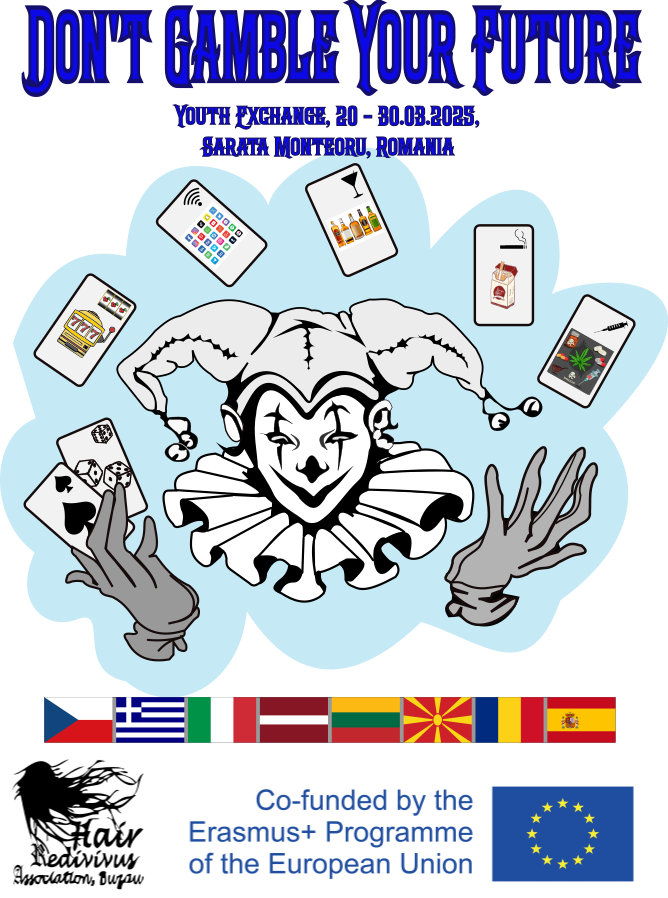From March 20 to March 30, 2025, I had the privilege to be part of the Erasmus+ youth exchange project “Don’t Gamble Your Future” held in Sarata Monteoru, Buzau, Romania. Together with fellow participants from Macedonia, we joined young people from Latvia, Lithuania, the Czech Republic, Greece, Italy, Spain and Romania for ten intense days of learning, cultural exchange and deep personal reflection.
The name of the project may sound like a catchy slogan, but the message it delivered was profound and life-shaping: understand the risks of addiction, learn how to make better choices and most importantly—take control of your future before it takes control of you.
Sarata Monteoru, a peaceful village known for its natural springs and green surroundings, became our temporary home. Away from the distractions of everyday life, the environment itself encouraged connection, openness and growth. The project brought together not just countries, but ideas. Yeah, it sounds cheesy, but it brought different perspectives and personal stories.
Each day was thoughtfully organised, balancing informative workshops with creative activities and time for bonding. It wasn’t just about sitting in a room and listening. It was about participation: active, intentional and at times, emotional.
“Youth and gambling” is not a common topic for conversation, especially in social settings. But this project didn’t shy away from uncomfortable truths. Through role-playing, group discussions, statistics and testimonies, we unpacked the psychological and social impact of gambling addiction. Many of us had never thought deeply about how this issue affects not only individuals but entire families and communities.
What struck me most was how relatable the topic became once we started sharing our views. Gambling is no longer just casinos and poker chips. it’s digital games, microtransactions and sports betting apps targeting youth. And not just gambling, but it spreads to other addictions, too. And without proper awareness, many of us could easily fall into patterns that seem harmless but slowly spiral out of control.
This project didn’t preach. It invited. It challenged. It changed.
One of the strongest aspects of this project was the cultural exchange. Presenting our countries gave us the opportunity to show pride in where we come from, but also to learn how others live, think and celebrate. We danced Greek dances, learned Spanish slang, tasted Lithuanian snacks and laughed at Romanian humour. These small moments were, in many ways, just as educational as the formal sessions.
Mixed group work was essential. We collaborated on video campaigns and awareness materials, designed peer-education tools and simulated real-life challenges youth might face when it comes to gambling. These exercises pushed us outside our comfort zones and taught us how to communicate effectively in multicultural teams.
This Erasmus+ project wasn’t my first, but it was definitely the most eye-opening one. I realised that personal development isn’t something that happens only in schools or universities. It happens when you talk to a participant who opens up about someone close to them dealing with addiction. It happens when you sit next to a friend and debate whether online gaming counts as gambling. It happens when you find yourself reflecting late at night about choices you’ve made – and the ones you’re about to.
I came back with more than memories and photos. I came back with awareness. I now view risky behaviours from a different lens. More than that, I learned that knowledge becomes powerful only when shared. That’s why I plan to bring back what I’ve learned to my community—to start conversations that matter, especially with young people who don’t realize they’re gambling more than money—they’re gambling time, focus, and future potential.
To those who have never joined an Erasmus+ project: you should. Not because it looks good on your CV (even though it does), but because it challenges you to grow in ways traditional education cannot. It teaches you how to live with people from different cultures, how to communicate without judgment, and how to understand topics that society often avoids.
“Don’t Gamble Your Future” was not just a name. It was a wake-up call. And thanks to this project, I’ve started listening.
Tomche Atanasovski






